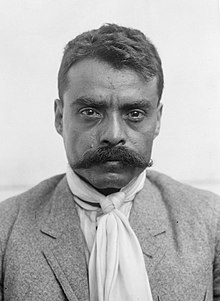Loading AI tools
Emiliano Zapata Salazar (8 August 1879 – 10 April 1919) was a Mexican revolutionary. He was a leading figure in the Mexican Revolution of 1910–1920, the main leader of the people's revolution in the Mexican state of Morelos, and the inspiration of the agrarian movement called Zapatismo.



- ¡Tierra y Libertad!
- Land and Liberty!
- A slogan popularized by Zapata, quoted in Tierra y Libertad (1920) published by Imprenta Germinal; further attributed to Zapata in works in the 1930s and later, including, Without History: Subaltern Studies, the Zapatista Insurgency, and the Specter of History (2010) by José Rabasa, p. 122, where the influence of the anarchist Ricardo Flores Magón on its development is also attested.
- Land and Liberty!
- I want to die a slave to principles. Not to men.
- As quoted in Heroes of Mexico (1969) by Morris Rosenblum, p. 112
- Prefiero morir de pie que vivir de rodillas.
- I'd rather die on my feet, than live on my knees.
- As quoted in Liberation Theologies in North America and Europe (1979) by Gerald H. Anderson and Thomas F. Stransky, p. 281; this is sometimes misattributed to the more modern revolutionary, Che Guevara, and to "La Pasionaria" Dolores Ibárruri, especially in Spain, where she popularized it in her famous speeches during the Spanish Civil War, to José Martí, and to Aeschylus who is credited with a similar declaration in Prometheus Bound: "For it would be better to die once and for all than to suffer pain for all one's life." The phrase "better that we should die on our feet rather than live on our knees" was spoken by François-Noël Gracchus Babeuf in his defence of the Conspiracy of Equals in April 1797. In French it read, 'Ne vaut-il pas mieux emporter la gloire de n'avoir pas survecu a la servitude?' but translated this bears no resemblance whatever to the quote under discussion. see: The Defense of Gracchus Babeuf Before the High Court of Vendome (1967), edited and translated by John Anthony Scott, p. 88 and p. 90, n. 12.
- Spanish variants:
- ¡Prefiero morir de pie que vivir siempre arrodillado!
- I'd prefer to die standing, than to live always on my knees.
- As quoted in Operación Cobra : historia de una gesta romántica (1988) by Alvaro Pablo Ortiz and Oscar Lara, p. 29
- I'd prefer to die standing, than to live always on my knees.
- Variant translations:
- Men of the South! It is better to die on your feet than to live on your knees!
- With an extension, as quoted in Timeless Mexico (1944) by Hudson Strode, p. 259
- I would rather die standing than live on my knees!
- It is better to die on your feet than to live on your knees!
- I prefer to die standing than to live forever kneeling.
- Prefer death on your feet to living on your knees.
- Men of the South! It is better to die on your feet than to live on your knees!
- I'd rather die on my feet, than live on my knees.
- La tierra es de quien la trabaja con sus manos.
- The land belongs to those who work it with their hands.
- Quoted as a slogan of the revolutionaries in Shirt-Sleeve Diplomat (1947) Vol. 5, p. 199, by Josephus Daniels, and specifically attributed to Zapata by Ángel Zúñiga in 1998, as quoted in Mexican Social Movements and the Transition to Democracy (2005), by John Stolle-McAllister
- The land belongs to those who work it with their hands.
- Ignorance and obscurantism have never produced anything other than flocks of slaves for tyranny.
- Remarks in regard to Pancho Villa, as quoted in The Unknown Lore of Amexem's Indigenous People : An Aboriginal Treatise (2008) by Noble Timothy Myers-El, p. 158
- The historic January 1, 1994, indigenous uprising led by the Zapatistas in Chiapas further strengthened the new sense of self. By April 22, 1994, it seemed that the spirit of Mexico's revolutionary hero Emiliano Zapata had marched straight from the mountains of Chiapas to Dolores Park, San Francisco.
- Elizabeth Martinez, De Colores Means All of Us (1998)
Wikiwand in your browser!
Seamless Wikipedia browsing. On steroids.
Every time you click a link to Wikipedia, Wiktionary or Wikiquote in your browser's search results, it will show the modern Wikiwand interface.
Wikiwand extension is a five stars, simple, with minimum permission required to keep your browsing private, safe and transparent.

